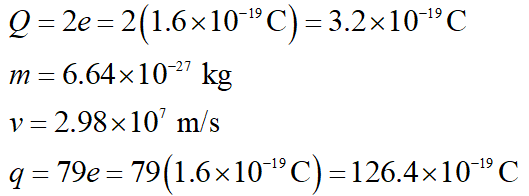In 1911, Ernest Rutherford and his assistants Geiger and Marsden conducted an experiment in which they scattered alpha particles (nuclei of helium atoms) from thin sheets of gold. An alpha particle, having charge +2e and mass 6.64 x 10 27 kg, is a product of certain radioactive decays. The results of the experiment led Rutherford to the idea that most of an atom's mass is in a very small nucleus, with electrons in orbit around it. Assume an alpha particle, initially very far from a stationary gold nucleus, is fired with a velocity of 2.98 x 107 m/s directly toward the nucleus (charge +79e). What is the smallest distance between the alpha particle and the nucleus before the alpha particle reverses direction? Assume the gold nucleus remains stationary. fm
In 1911, Ernest Rutherford and his assistants Geiger and Marsden conducted an experiment in which they scattered alpha particles (nuclei of helium atoms) from thin sheets of gold. An alpha particle, having charge +2e and mass 6.64 x 10 27 kg, is a product of certain radioactive decays. The results of the experiment led Rutherford to the idea that most of an atom's mass is in a very small nucleus, with electrons in orbit around it. Assume an alpha particle, initially very far from a stationary gold nucleus, is fired with a velocity of 2.98 x 107 m/s directly toward the nucleus (charge +79e). What is the smallest distance between the alpha particle and the nucleus before the alpha particle reverses direction? Assume the gold nucleus remains stationary. fm
College Physics
11th Edition
ISBN:9781305952300
Author:Raymond A. Serway, Chris Vuille
Publisher:Raymond A. Serway, Chris Vuille
Chapter1: Units, Trigonometry. And Vectors
Section: Chapter Questions
Problem 1CQ: Estimate the order of magnitude of the length, in meters, of each of the following; (a) a mouse, (b)...
Related questions
Question

Transcribed Image Text:In 1911, Ernest Rutherford and his assistants Geiger and Marsden conducted an experiment in which they scattered alpha particles (nuclei of helium atoms) from thin sheets of gold. An alpha particle, having
charge +2e and mass 6.64 x 10-27 kg, is a product of certain radioactive decays. The results of the experiment led Rutherford to the idea that most of an atom's mass is in a very small nucleus, with electrons in
orbit around it. Assume an alpha particle, initially very far from a stationary gold nucleus, is fired with a velocity of 2.98 × 107 m/s directly toward the nucleus (charge +79e). What is the smallest distance
between the alpha particle and the nucleus before the alpha particle reverses direction? Assume the gold nucleus remains stationary.
fm
Expert Solution
Step 1
Write down the given values using suitable variables.

Here, Q signifies alpha-particle charge, e signifies one electron charge, m signifies alpha-particle mass, q signifies gold-particle charge.
Trending now
This is a popular solution!
Step by step
Solved in 2 steps with 3 images

Knowledge Booster
Learn more about
Need a deep-dive on the concept behind this application? Look no further. Learn more about this topic, physics and related others by exploring similar questions and additional content below.Recommended textbooks for you

College Physics
Physics
ISBN:
9781305952300
Author:
Raymond A. Serway, Chris Vuille
Publisher:
Cengage Learning

University Physics (14th Edition)
Physics
ISBN:
9780133969290
Author:
Hugh D. Young, Roger A. Freedman
Publisher:
PEARSON

Introduction To Quantum Mechanics
Physics
ISBN:
9781107189638
Author:
Griffiths, David J., Schroeter, Darrell F.
Publisher:
Cambridge University Press

College Physics
Physics
ISBN:
9781305952300
Author:
Raymond A. Serway, Chris Vuille
Publisher:
Cengage Learning

University Physics (14th Edition)
Physics
ISBN:
9780133969290
Author:
Hugh D. Young, Roger A. Freedman
Publisher:
PEARSON

Introduction To Quantum Mechanics
Physics
ISBN:
9781107189638
Author:
Griffiths, David J., Schroeter, Darrell F.
Publisher:
Cambridge University Press

Physics for Scientists and Engineers
Physics
ISBN:
9781337553278
Author:
Raymond A. Serway, John W. Jewett
Publisher:
Cengage Learning

Lecture- Tutorials for Introductory Astronomy
Physics
ISBN:
9780321820464
Author:
Edward E. Prather, Tim P. Slater, Jeff P. Adams, Gina Brissenden
Publisher:
Addison-Wesley

College Physics: A Strategic Approach (4th Editio…
Physics
ISBN:
9780134609034
Author:
Randall D. Knight (Professor Emeritus), Brian Jones, Stuart Field
Publisher:
PEARSON